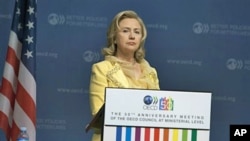The United States wants Pakistan to start living up to its commitments in the fight against terrorism.
U.S. Secretary of State Hillary Clinton said Thursday that Pakistan has not always acted decisively, and that it is time for Islamabad to meet Washington's "expectations." Clinton did not say what those expectations are.
Clinton's comments came in response to questions from reporters during an economic conference in Paris.
Relations between the U.S. and Pakistan have been strained ever since U.S. commandos secretly entered Pakistan May 2 and killed terrorist mastermind Osama bin Laden.
Maintaining strategic relations
Despite the tensions, Clinton said the U.S. needs to maintain a strategic, long-term relationship with Islamabad. She also praised Pakistan for engaging in its "own bitter fight with these terrorists."
A U.S. military spokesman said Wednesday that Washington has started reducing its military presence in Pakistan at Islamabad's request. There are more than 200 U.S. military personnel in Pakistan serving mostly as trainers as part of efforts to counter al-Qaida and Islamic militants.
Late Wednesday, Pakistani Prime Minister Yousuf Raza Gilani said his country is entering a "defining phase" [new, critical phase] in the fight against terrorism.
Aggressively pursuing terrorists
Following a meeting with military and intelligence leaders, Gilani said security, defense and law-enforcement agencies will be authorized to use "all means necessary" to eliminate terrorists. He also said the government will ensure that terrorist hideouts are destroyed.
His comments come amid renewed concerns about Pakistan's ability to contain a growing and more active militant threat, causing some experts and foreign officials to question the safety of Islamabad's nuclear arsenal.
Twice this week, militants have struck at Pakistani security installations with devastating results.
The Pakistani Taliban claimed responsibility for a suicide bombing Wednesday at a police building in the northwestern city of Peshawar that killed at least eight people. A spokesman said it was the latest attack in retaliation for the U.S. killing of al-Qaida leader Osama bin Laden in Pakistan.
Fierce battles, counter-offensives
Earlier this week, Taliban militants laid siege to a naval base in the southern port city of Karachi, killing 10 security personnel and destroying two U.S.-supplied surveillance aircraft.
The Pakistani military has launched offensives in several areas of the country's northwest in an effort to dismantle and disrupt militant groups. The military efforts have mainly targeted domestic Taliban elements, which have killed thousands of Pakistanis in terror attacks across the country.
Pakistan received $2.7 billion in security-related assistance from the United States in the fiscal year that ended last October. It is the third-largest recipient of U.S. security aid and reimbursements, after Afghanistan and Israel.
Some U.S. lawmakers have threatened to cut off funding following the recent tensions between the two governments.
Some information for this report was provided by AP, AFP and Reuters.




